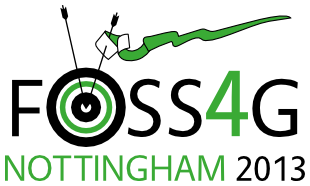Presentation
OpenPOIs: An Open Source, Open Data Index To POIs
Denise McKenzie (OGC)
12:30 on Thursday 19th September (in Session 6, starting at noon, EMCC: Room 4)
Show in Timetable
OpenPOIs [http://openpois.ogcnetwork.net], a new OGC project, is a very large freely available open database containing points of interest (POIs) and links to other commercial, governmental, and academic POI databases. Everyone is free to contribute and access is free. It is intended to be a widely used public resource inspired by policies and practices similar to those of Wikipedia and OpenStreetMap. So far, OpenPOIs contains names and locations for over 10 million business and civic places. OpenPOIs embodies three facets of openness. First, the data set is open. Only POI repositories with compatible open data policies have been indexed by OpenPOIs. Second, the API is open. Anyone is free to use the read API, and a write API is being built for any authenticated user to freely add information. Thirdly, the code is open. The system is built on PostGIS, Mapserver and custom PHP. To create the OpenPOIs database, POIs have been collected from many sources, including: Geonames (which in turn is built from the US Geological Survey, US National Geospatial-intelligence Agency, CIA World Factbook, hotels.com and over a hundred others), DBPedia, OpenStreetMap, Futouring (Rome, Italy area cultural tourism POIs) and the Harvard China Biographical Database. The OGC is looking for data publishers and developers to work with us in creating the largest open system of linked geospatial data on the Web. If you have a POI database, let's talk! Are you a historical data curator? We support time-based queries and historical data storage so that you can publish and find all the information about a place, not just what's there today. And of course, we want developers of mobile apps, research tools, concierge services, and local resource finders to build on the OpenPOIs platform. Like OGC standards, OpenPOIs is part of the public Internet infrastructure. OGC standards and OpenPOIs are platform, vendor and data neutral. The OGC's vision and mission, experience with legal and organizational issues involved in "openness", and rich connections to the world's providers and users of geospatial data and technology put the Consortium in a unique position to launch and host this resource. The potential societal benefits are broad and deep. Linked POI registries will support disaster management, public health, resource management, science, and more. Better geospatial standards are another benefit of this project. Current growth areas in Web-based computing are "RESTful" programming, linked data and the Semantic Web. OpenPOIs is designed to accommodate and leverage these developments. The Web and Semantic Web provide tools with which the POI vision can be achieved, and OpenPOIs provides the data. Existing OGC Web Services (OWS) standards have just begun to evolve to track these developments, and experience gained with the OpenPOIs Registry will help move the standards forward.
